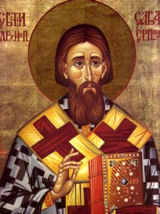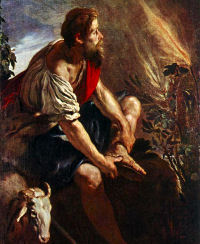Advent: December 5th
Wednesday of the First Week of Advent
» Enjoy our Liturgical Seasons series of e-books!
Old Calendar: St. Sabbas, abbot
St. Sabbas is pictured as an abbot with an apple. He was once tempted to eat an apple outside of the prescribed mealtime, whereupon he vowed never to eat apples again. The Martyrology says: "At Mutala in Cappadocia the holy abbot Sabbas; in Palestine he gave the shining example of a holy life. Untiringly he labored in defense of the true faith against those opposing the Council of Chalcedon." In Jerusalem he built a famous laura (as oriental monasteries are called), which bears his name. When the Arabs later conquered the Holy City, the monks fled to Rome, where they built a monastery and introduced the veneration of their saint. In the Eastern Church St. Sabbas ranks high in popular devotion; he is distinguished by the titles "God-bearer, the Saint, Citizen of the Holy City, Star of the Desert, Patriarch of Monks." This feast is celebrated in the Extraordinary Form of the Roman Rite.
St. Sabbas Saint Sabbas the Sanctified was born in the fifth century in Cappadocia, in the pious Christian family of John and Sophia. His father was a military commander. Journeying to Alexandria on military matters, his wife went with him, but they left their five-year-old son in the care of an uncle. When the boy reached eight years of age, he entered the monastery of St. Flavian, located nearby. The gifted child quickly learned to read and became an expert on the Holy Scriptures. In vain did his parents urge St. Sabbas to return to the world and enter into marriage. At seventeen years of age he received monastic tonsure, and attained such perfection in fasting and prayer that he was given the gift of wonderworking. After spending ten years at the monastery of St. Flavian, he went to other monasteries. St. Sabbas lived in obedience at this monastery until the age of thirty.
Saint Sabbas the Sanctified was born in the fifth century in Cappadocia, in the pious Christian family of John and Sophia. His father was a military commander. Journeying to Alexandria on military matters, his wife went with him, but they left their five-year-old son in the care of an uncle. When the boy reached eight years of age, he entered the monastery of St. Flavian, located nearby. The gifted child quickly learned to read and became an expert on the Holy Scriptures. In vain did his parents urge St. Sabbas to return to the world and enter into marriage. At seventeen years of age he received monastic tonsure, and attained such perfection in fasting and prayer that he was given the gift of wonderworking. After spending ten years at the monastery of St. Flavian, he went to other monasteries. St. Sabbas lived in obedience at this monastery until the age of thirty.
He was later blessed to seclude himself in a cave. On Saturdays, however, he left his hermitage and came to the monastery, where he participated in divine services and ate with the brethren. After a certain time St. Sabbas received permission not to leave his hermitage at all, and he struggled in the cave for five years. After several years, disciples began to gather around St. Sabbas, seeking the monastic life. As the number of monks increased, a lavra sprang up. When a pillar of fire appeared before St. Sabbas as he was walking, he found a spacious cave in the form of a church.
St. Sabbas founded several more monasteries. Many miracles took place through the prayers of St. Sabbas: at the Lavra a spring of water welled up, during a time of drought there was abundant rain, and there were also healings of the sick and the demoniacs. The saint surrendered his soul to God in the year 532.
Symbols: Abbot with an apple.
Things to Do:
- Learn about the icon of the Mother of God called the "Milk-Giver" and its connection to St. Sabbas.
- Take some time-off from TV viewing and make time for family reading of the Scripture passages concerning the Messiah (portions of Isaiah, the birth and infancy narratives).
- Make preparations for the feast of St. Nicholas. Tonight many families put out their shoes or stockings for St. Nicholas to fill. Also many families celebrate with a party on St. Nicholas Eve.
- Don't forget to pray "Hail and Blessed be the hour...", the Christmas Anticipatory Prayer every day until Christmas.
- Read this longer biography of St. Sabas to find out why he is pictured with an apple.
- Read St. Sabbas the Sanctified and his Holy Lavra.
- Visit this site to learn more about the ancient monastery established in the 5th century by St. Sabas.
